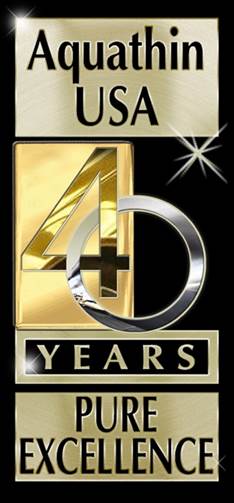Lawsuit: Arsenic standard is unconstitutional
"Aquathin OP-ED Commentary"
Dear Aquathin Dealer OnLine, Splash NewsBulletin and Allergic Reaction NewsBulletin Members;
First of all I want to point out that because I won the genetic lottery and was borne in America, I have the privilege of freedom of speech to make such a statement as in the subject of this email....and for that I am forever thankful daily. Having said that up front, you won't mind this. The moronic issue below, which has a very slim chance of succeeding, is either to raise the ego radius of this lawyer or delay action against the municipal plants that will have to undergo the expense to comply. The result could be (hopefully someone with clought and intelligence will step up to the plate first), consumers will be allowed to drink water laced with elevated and disease causing levels of arsenic....all except those with Aquathin of course! I love my Aquathin!!
Lawsuit: Arsenic standard is unconstitutional
WASHINGTON — The Competitive Enterprise Institute (CEI) filed a legal brief in a federal appeals court this week marking the first major move in its challenge of the new 2006 standard for arsenic in drinking water. CEI is challenging the US Environmental Protection Agency (EPA) and the Safe Drinking Water Act (SDWA), which contains the arsenic standard, on constitutional grounds. It is being joined in the matter by the state of Nebraska, a staunch opponent of the new standard that calls for lowering the amount of arsenic allowable in drinking water from 50 parts per billion (ppb) to 10 ppb. CEI said in January it would represent small water systems in joining the legal battle being fought over the proposed lowering of the arsenic standard. Sam Kazman, CEI cheif counsel, said the challenge would be on constitutional grounds, claiming the interstate commerce clause does not call for the regulation of water.
He told WaterTechOnline on Thursday that in any constitutional challenge "the odds are against you" in getting a ruling overturned, but "we're raising some very serious questions" and reiterated that the legal maneuver is a "serious challenge" to the standard. "The gist isn't whether EPA did the science right or the costbenefit analysis right" in establishing the new limit, Kazman said. Basically, CEI's case says that the US Supreme Court has made it clear in the past that there are limits to the federal government's power to regulate under the Commerce Clause. In enacting the Safe Drinking water Act, which contains the arsenic standard, Congress illegally abandoned the Commerce Clause limits it previously observed in regulating drinking water.
"EPA's arsenic standard for drinking water imposes stringent limits on a contaminant that is not contagious," said the legal papers filed in Washington. "The target of its regulation, drinking water, is produced by water systems predominantly serve community residents and local customers, and that ship across state lines only in the rarest of cases. The Safe Drinking Water Act, the statutory authority for EPA's regulation, was enacted with minimal regard for contagion and interstate commerce, factors which were the original focus of federal drinking water regulations.
"For these reasons, both the standard and the act exceed Congress's regulatory power under the Interstate Commerce Clause," said the 30-page document. CEI said it is clear from a series of Supreme Court decisions that federal power encompasses only economic activities that "significantly and directly affect interstate commerce." Under those decisions, the cumulative cost of a traditionally local issue like health does not transform it into a target for federal regulation. "Moreover, both the arsenic rule and the act are contrary to the 10th Amendment, inasmuch as they unjustifiably intrude on the protection of health, an area that has long been a state government function in the absence of such special factors as communicability," the court document states.
Kazman said according to the case schedule, the EPA will file a legal brief by 20 January, and the National Resources Defense Council, which supports the EPA, will file papers by 7 March. Oral arguments in the case are set to begin 15 April, Kazman said.
FOR THE BEST TASTE IN LIFE
Think Aquathin...AquathinK!!
Edited from Tech Bank 10/28/02


